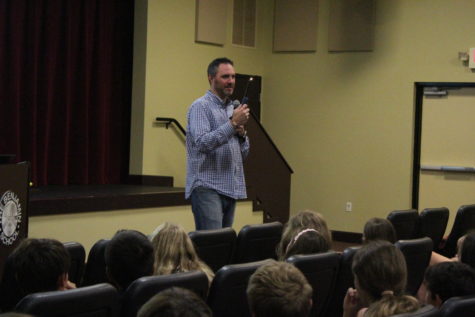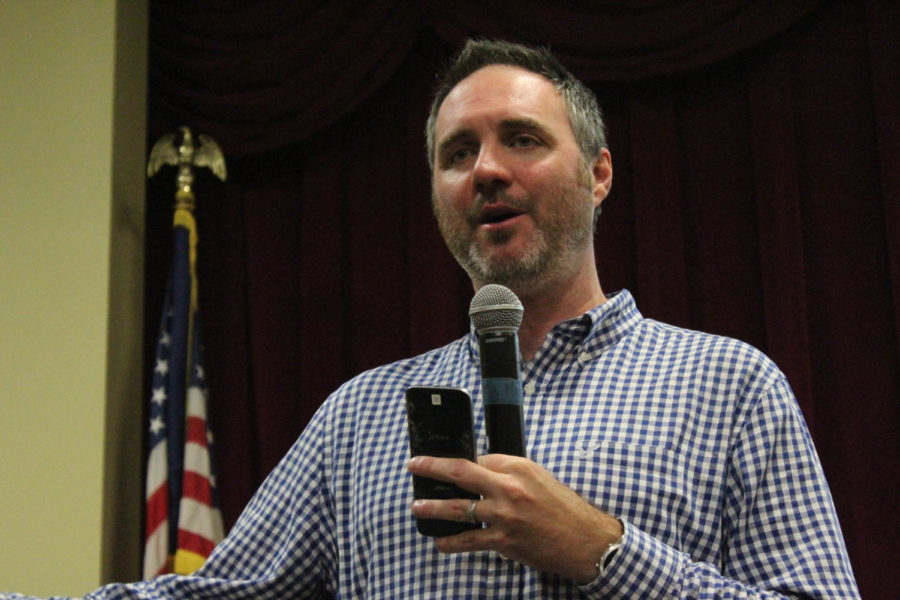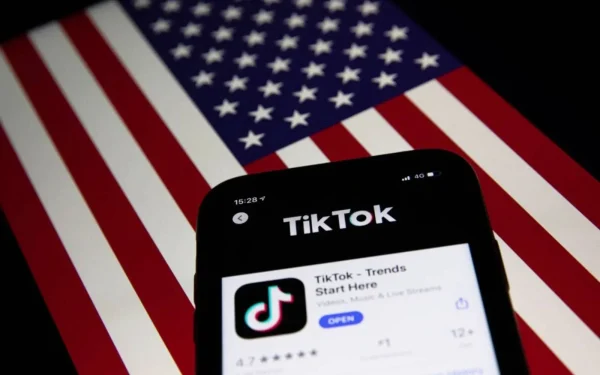Cyber Guru Richard Guerry Talks to Students About Online Behavior
Richard Guerry speaks to students about how and why to be careful with technology.
Rules of technology: don’t post pictures of yourself that you wouldn’t want your grandma seeing, don’t post when you are going out of town, and don’t post when you’re angry. These are just a few, and there are many more where those came from. Phew! Just read Mr. Richard Guerry’s book to find out how to properly navigate the ever-shifting world of technology in which we live. I know, I know that sounds pretty boring, but trust me, it is worthwhile!
Guerry, the executive director of the Institute for Responsible Online and Cellphone Communication (IROC2) and author of Public and Permanent, a how-to guide detailing the proper use of technology, recently visited the Benjamin Middle School. On October 17, 2018, he addresses students in the Barker Performing Arts Center in grades four through eight about cyber safety. His talk included the pros and cons of social media, the issues and dangers of cyberbullying, and making wise decisions when using technology.
During Guerry’s presentation, he constantly waved his phone around, using it not only as a prop, but a symbol of an individual’s identity since most every person in America has one and it’s so closely tied with the way we communicate.

Guerry uses fire to prove his point about how technology is dangerous.
He also carried a grill lighter, which he flicked on and off, comparing it to modern technology and the Internet. “You know, if we gave matches to everybody on the planet and didn’t teach them fire safety, why is it fair that that person had to burn themselves to learn how to use the matches?” he said.
The same goes for online communications which includes texting, apps, social media, etc. The more students use it, and the more careless they are in how they use it, the more likely they are to get burned by their poor choices.
Guerry became passionate about teaching students about the dangers of poor decision-making with technology almost 10 years ago. “I used to be in the corporate world and my job was basically to track people as an interactive marketer,” he said. “In 2009, I saw a lot of people getting in trouble [over the Internet] and they didn’t really understand why, and I thought, that’s not right.”
Throughout his hour-and-a-half presentation, Guerry gave students various examples of the dire consequences people experienced after making poor choices online. One individual accidentally texted inappropriate pictures of himself to his boss, prompting him to get fired. Another group of pre-adolescent boys shared information with a stranger via the online video game World of Warcraft, and the stranger tracked one of the boys to his house and tried to kidnap him. Guerry preached his signature phrase – and the name of his book – “public and permanent,” during his address, meaning he wanted students to know that whatever they put online has the potential to become public and permanent and be forever associated with their digital footprint.
“Digital tools and technologies are very powerful tools of convenience and communication, and the abuse of these powerful tools, like anything else, often leads to tragedy,” wrote Guerry in his book.
Guerry felt compelled to write the book in order to provide people with what he calls a “digital consciousness.”
“The inspiration for the book was to give people who were seeing [my talk] live a way to read more about it at a slower pace and in more detail because we are trying to create an entire mindset,” said Guerry. “It is not just about the two words [public and permanent], it’s really about a way of thinking about technology,” he said.
After seeing Guerry’s presentation, students had a deeper appreciation for how to handle technology. “Everything I post is public and permanent, and even if I try to delete it, it [may] not delete and it [could] stay online forever,” said seventh grader Tara Citanak. “It could haunt me and make me not get into the college of my choice,” she said.
“He was very enthusiastic about the topic which kept me interested,” said eighth grader Eric Levine, “and the best part about it was that we learned more information about the dangers of cellular devices if they’re used wrong.”
Teachers also found Guerry’s talk to be timely and important.
“I thought it was an excellent presentation,” said seventh-grade Humanities teacher Mrs. Denise Ponchock. “He spoke directly to the students, and I think he was on the mark addressing areas of concern and pointing out problems students can run into when they are online without making it too scary and too daunting. He presented a problem and offered solutions,” she said.
Guerry made the point that technology isn’t bad, it’s just that people make bad choices when using their devices. So, his mission is to make sure students use technology wisely and think before they post. In fact, his curriculum from iroc2.org has even been employed by Digital Media Director Mr. Nicholas Crisafi.
“I use Mr. Guerry’s curriculum in my Digital Tools and Citizenship class which I teach to the sixth graders,” said Crisafi. “His message is simple, but very true, and he does a great job illustrating his points with examples, and communicating that we live in a digital world where everyone needs to be aware of what they put online.”





